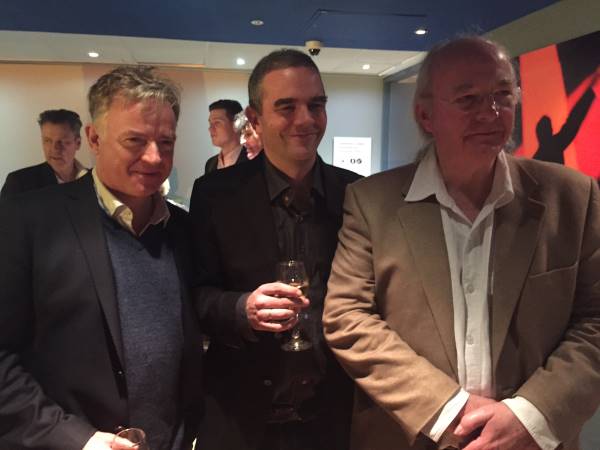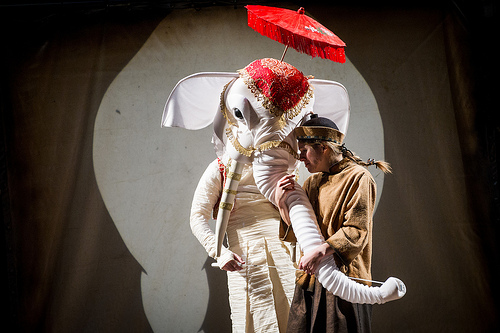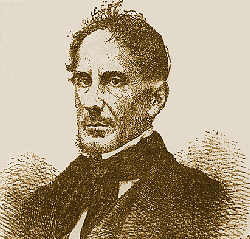Blog
Monthly Archive: 2015
A nice surprise
Posted on Friday, December 11, 2015
The new run of The Firework Maker's Daughter has just opened at the Royal Opera House (Grab the last tickets before they go!). Sometimes all you need is a simple tweet to make all the hard work seem worth while. Especially if it's a tweet like this:
'The Firework-Maker's Daughter' at the Linbury Studio last night was one of the best treatments a story of mine has ever received. Loved it!
— Philip Pullman (@PhilipPullman) December 11, 2015It was an honour and a surprise to meet the great man at the show, chat a little about his own initial school production of the story twenty plus years ago, the joy of fireworks and gamelan - and to raise a glass to Lila.

Glyn Maxwell, myself and Philip Pullman
Two for one
Posted on Wednesday, October 7, 2015
Tickets are now on sale for both of my forthcoming opera productions.

Nothing comes to Glyndebourne in February 2016, for three performances. You can read more about it here and buy tickets here. As there are 50+ young people involved who all have families, presumably seats will go pretty quickly, so snap them up while you can.

Meanwhile, it's a great honour to receive my first ever revival - The Firework Maker's Daughter returns to Covent Garden for a huge run of almost 30 performances over Decemeber and January. The piece ends with a firework competition, and as such I always felt it was perfectly suited to performances over the festive season leading up to the New Year, so it's great to see it finally occupying that slot. Details and tickets here
Thoughts on Nothing
Posted on Wednesday, June 10, 2015

In Part 3 of this altogether brilliant post, Peter Casey talks about the power of not stating what you're singing about. He's talking about sex - how there's a much more useful tension for the actor and director to play with if we all know what the character wants, but they sing about something completely different; but the theory applies elsewhere too.
One of the first times I felt I'd accomplished something that made a genuine artistic statement was with a mini-opera I wrote for Tete a Tete back in 2002 called Has it Happened Yet? It features three very elderly ladies in various states of decrepitude who are wheeled out by their perky nurse to watch a solar eclipse. It's unclear to the audience whether any of them are in any state to take it in, and as one of the glories of nature rolls by in musical interlude, the old ladies stare out at us, saying nothing. Then one of them repeats the line she's been saying throughout - "has it happened yet?" - and the piece ends.
That piece had emerged out of a chat director and librettist Bill Bankes Jones and I had had when developing the piece, when he asked me for some favourite moments in opera. I straight away mentioned the scene in the field in Wozzeck where Wozzeck and his companion are gathering mushrooms and Wozzeck somewhat deleriously sees disturbingly meaningful patterns in the way the mushrooms lay on the ground. The music swirls with comparable musical puzzles and codes - so beloved of Berg - and the whole thing gives me the almighty shivvers every time I hear it.
But I guess the reason it gives me the shivvers are largely of my own invention - they tap in to some sense I have of the power of nature and the mystery of life, it's what I, the listener have supplied that makes it powerful to me. Or rather, Berg has allowed space in the meaning of his piece for me to bring something to it, and when that happens in art, I think that's when we feel the most powerful reactions.
Bill and I never explicitly said what the point of Has it Happened Yet was, but reflections on mortality, on the mystery of nature and more all floated around in the air for the audience themselves to discover. The absence of their direct statement created a tension comparable to what Peter Casey talks about in his post.
Another nice example of this I would suggest is Thomas Ades's brilliant Powder her Face. How brave, I've always thought, of a composer who is renowned for his surface glitter to write an opera about someone who is glamorous on the outside but hollow inside. Talk about turning your potential weaknesses into strengths - you can't help but fantasize that the young Ades (he was 24 when he wrote it which is frankly obscene) looked at himself with the jaded self-loathing eyes of a prodigy and thought, yes, I'm like her, let's write an opera about that! As a result, Powder her face seethes with this dramatic tension - what is the piece saying? What should we admire in this world where everyone seems pretty awful? I've read numerous different interpretations of what the work is about, and essentially all of them are valid, because the piece offers the space to allow them.
****
All of this is by way of introducing my newly completed opera Nothing, co-commissioned by Glyndebourne and the Royal Opera House, and premiering in Glyndebourne in February 2016. It was John Fulljames from ROH who first proposed the book - a young adult novel by the Danish author Janne Teller and just from the synopsis I knew it was fruitful operatic territory.
In the story, Pierre Anton (just Pierre in our version) stands up in class on the first day of school and says Nothing Matters - it's all meaningless, it's all pointless. He goes off and sits at the top of a plum tree for the rest of the opera, pouring scorn and plums on anyone who comes within earshot. The rest of the class are somewhat perturbed by this and set out to prove him wrong. They collect personal possessions they feel have 'meaning', and when this proves to be insufficient, they agree to nominate each other for the items they must give up. This soon spirals downhill and leads them down a very dark path with grotesque and gruesome consequences.
What I particularly admire in the book is that the whole question of 'Meaning' - whether there is any, and if so, what it is - is left completely unanswered - it is left to the reader to make up their own mind. Is Pierre actually correct - an uncomfortable but possible interpretation, particularly since the actions of the rest of the class are, by the end of the story, clearly misguided to say the least. Or is there a third option somewhere in between - or a fourth or a fifth?
I knew from my experience with Has it Happened Yet? that in such ambiguities music could usefully flourish, saying so much more than words could ever say, and allowing thoughts, emotions and ideas to blossom in the mind of the listener.
Consigning to the flames - the dirty sonnets of Giuseppe Belli
Posted on Saturday, April 18, 2015

Visitors to the Young Vic in London will know of the wonderful little arts book shop that sits opposite the theatre on The Cut. With half an hour to kill before a meeting, it was there, some years ago, that I stumbled across the obscure-sounding Sonnets by the 19th Century Roman poet Giuseppe Giaocchino Belli. Sounds dry and dusty right? You flick through a page or two in these virtuoso translations by Mike Stock, and to your surprise you come across lines like these:
Just listen to a mother talking crap:
the brat she drops has barely hit the ground
before she's bragging he's the best around,
and if you disagree you get a slap...
...To mum, the gruntings of this tit-mad junkie
surpass the sweet songs of a West End name.
The mothers of this world are all the same.
or
So having read the Gospel, there and then
that good and learned father plonked his rear
against the altarpiece, and - crystal clear -
explained the mysteries of faith to men,...
...In short, and from this sermon that we got,
to sum it up, to say it how it is,
it seems that mysteries are mysteries
or the infamous 'Philiosphic Café Proprietor':
The people of this world are much the same
as coffee beans inside the grinder's mill;
one's first, one's later and one's later still
but all are going down towards one doom..
The sonnets are written in Romanesco, a dialect spoken apparently by the original inhabitants of Rome, and still spoken today, it's the language of the street and Belli's project was to capture it in it's raw unadulterated form. The poems feel incredibly modern, in their observance of the minutiae of every day life (the nipple pain of a breast-feeding mum); their unabashed rudeness (a whole sonnet to different names of what my son would call 'privates'); a Jerry-Springer-the-Opera-approach to blasphemy (descriptions of the best confessional booth to grab an intimate moment); and their black-humour cynicism (as the coffee grinder excerpt above testifies).
But reading the brief biography of Belli that comes with the poems, it's fascinating to see what a compromised character Belli himself was. The bulk of his sonnets come from a period in his life in which he was lucky enough to find himself a wealthy wife, from which position of luxury he could afford to undertake the radical and daring work - brazenly criticizing authority and corruption, openly exposing society's most hidden and uncomfortable truths - that the sonnets represent. But when his wife died and he was forced to earn a living, he quickly turned coat and cosied up to the establishment, even re-joining and eventually becoming president of a the fusty writer's association "Accademia Tiberina" from which he had once flamboyantly resigned "for ever". He wrote strongly against liberal causes he had once subscribed to; and turned his back on his Romanesco project to the extent that he very nearly burned the entire collection.
But the biographer argues that it is Belli's compromised character that allowed him to see the frailty in others.
"it is the morals culpability that Belli shares with his targets, his lack of angst in the face of moral contradiction, that endows him with the power to portray the compromised people of Rome and capture their complex humanity"
This confirms one of my many slowly-developing pet-theories, that in some cases at least, the work for which an artist is best remembered emerges from a part of the artist, with which the artist themselves is not entirely comfortable. I guess there is an element in all art that shocks - if something is a truly new vision it will take society a while to adjust to it; but this takes that idea a stage further - it is the idea that the vision is a shock to the artist themselves. How are we, as artists, supposed to reconcile these opposing voices within ourselves, and to recognise that our best work may sometimes be that which we are most tempted to guiltily consign to the flames?
Making it work
Posted on Tuesday, January 6, 2015
I like what Glyn Maxwell says in his book On Poetry (discussed here) that he had 'nothing to say' until his mid-30s and instead spent his time 'playing with words'. For composers as for poets, I think there's so much technique to learn, it's not even worth thinking about whether you have anything to say for a considerable period - and for me that was definitely well into my 30s as well. I've no idea how my 'career' seems from the outside, but even now, in my mid-40s I feel I'm only starting to be on top of how to handle all the instruments, and all the combinations of instruments - and looking back, I recognise the feeling that I had all through my younger years, that it didn't really matter what I was trying to say at that stage - I was still nowhere near having the tools to even think about saying anything meaningful or coherent. I've now finally had two big orchestral pieces premiered, which allowed me to start wrestle with that particular demon, and pleased as I am with the results, I still feel a long way from what I think I should be able to achieve. That's probably the way most artists feel, even when they're 100.
I don't want to get into commenting on the success or otherwise of particular composers and their aesthetics here (being a judgmental composer, I can find huge gaping holes even with some of my favourite pieces and/or pieces that have exerted a huge influence over me), but what really makes me happy and inspired listening to my colleagues' work is when I sense someone achieving amazing things in their control of the instruments. Three pieces have made me feel that way in the past couple of years:
What's interesting is all three use standard orchestral instruments (actually Stuart managed an equally impressive integration of some electronics into his score), but find new ways of using the old 'avant-garde' techniques that make them sound fresh and exciting. I love exploring these territories, finding new sounds, but I do usually opt for a fairly tentative approach - for example, I did use a hand-slap on the Tuba mouthpiece in Night Parade - and loved the effect - but Andrew Norman uses a whole ensemble of them in Play (the score is, by the way, viewable online here - how marvelous that publishers do this these days), as well as some great "air sounds" and much much, more besides - what's really refreshing about it is, unlike some of the old scores by Penderecki et al which use these effects and can seem a bit stuffy these days - Norman's piece is really witty. I suspect, like Ades and Macrae, Norman was way-too-gifted way-too-young - he's apparently 35 now, so I guess I can just about forgive him (-: But how exciting to see what what these composers can achieve with their incredible techniques in the coming years.

